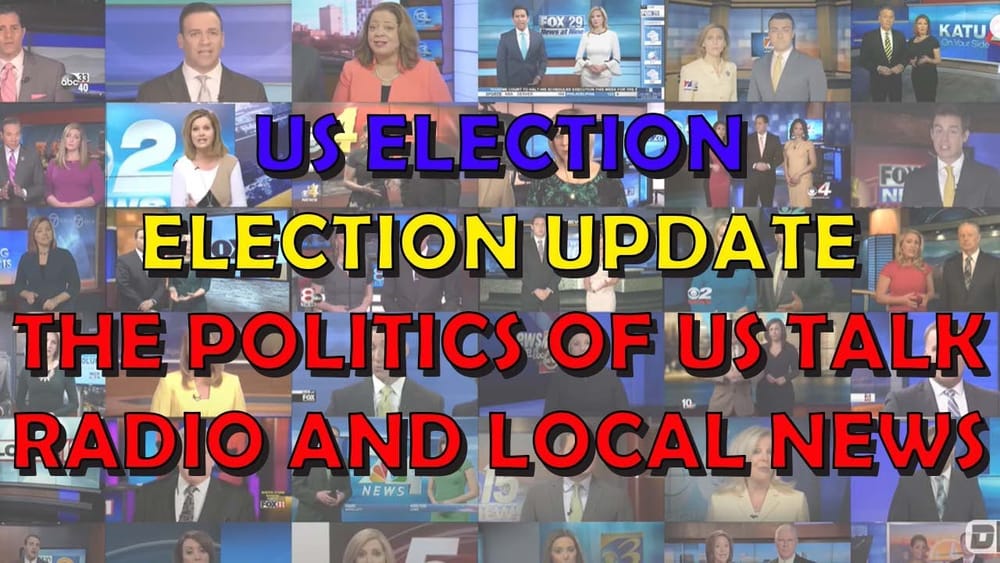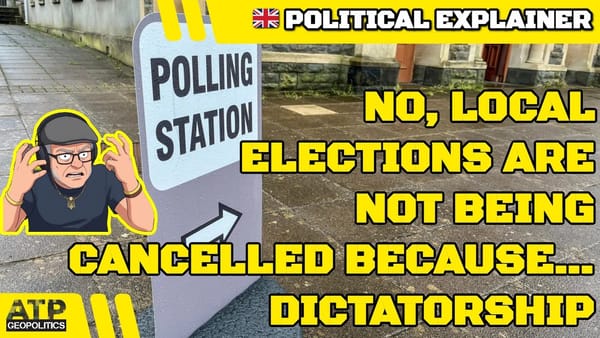US Politics Election Extra: The Politics of US Talk Radio and Local News TV
Table of Contents 📖
"If if the left wing wants to really properly compete in the media world in information spaces in the us they have to do this and i can't believe it's taken this long uh but but this absolutely has to happen in order for there to be fairness you can't just expect there to be 1,500 conservative talk radio stations and zero liberal ones, or like a handful of ones that are just holding out here and there."
Hello Team
🎦 00:00-00:38⏩
Jonathan introduces the video explaining that it will be a US Election special focusing on US Talk Radio.
Return to top⤴️
Conservative dominance of US Talk Radio
🎦 00:38-02:32⏩
Jonathan explains that unlike in the UK and Europe, US Talk Radio is dominated by Conservative voices and used as a campaigning tool for the Republican Party.
- He refers to an interview by The Bulwark with Michael Medved, an anti-Trump conservative talk radio host.
- Many conservative talk radio hosts felt pressured to support Trump to protect their careers and secure advertising revenue.
Michael Medved: A Never Trumper
🎦 02:32-06:55⏩
Jonathan plays a clip of the interview with Michael Medved by The Bulwark.
- Medved states that many Conservative Talk Radio hosts felt unable to speak out against Trump for fear of losing their jobs or being dropped from their networks.
- Medved himself lost over 100 affiliate stations as a result of not supporting Trump.
- He became a "Never Trumper" in 2015, citing Trump's promotion of the "birther" conspiracy theory as unacceptable.
Sinclair Broadcast Group: Right Wing Spin on Local News
🎦 06:55-13:36⏩
Jonathan moves on to discuss how pervasive right wing campaigning is through the media, focusing on local television and radio stations, in particular Sinclair Broadcast Group.
- He highlights how Sinclair, a corporation, owns a large number of local television news stations across the US. Many viewers may not realise these are Sinclair stations as they appear under the branding of major networks such as CBS, NBC, and Fox.
- Jonathan cites a report that "of the 294 TV stations that Sinclair owns or operates, at least 70 of them air Sinclair's in-house national evening news broadcast".
- He argues that this effectively allows Sinclair to pump right-wing propaganda into millions of homes, often without the viewers realising.
- Jonathan references several episodes of Last Week Tonight with John Oliver from 2017, 2018 and 2021 which provide a "brilliant" insight into how Sinclair operates. He plays a short clip from one of these in which numerous local news anchors can be heard delivering an identical script warning viewers about the dangers of "one-sided news stories".
The Rise of Conservative Talk Radio
🎦 13:56-18:03⏩
Jonathan returns to the topic of US Talk Radio and how it differs from other countries.
- He cites the Wikipedia page for Conservative Talk Radio, noting that "within the next decade, Conservative Talk Radio became the dominant form of commercial talk radio in the United States".
- He highlights how the rise of Rush Limbaugh in the 1990s coincided with a resurgence in AM radio, and how this, combined with the consolidation of radio station ownership, allowed conservative voices to be syndicated more easily.
- The 9/11 terrorist attacks led to a surge in nationalism and increased the popularity of conservative talk radio hosts such as Glenn Beck, Sean Hannity, Laura Ingraham, and Michael Savage.
- Attempts to establish progressive talk radio stations, such as Air America Radio in the mid 2000s, ultimately failed.
Why Talk Radio is So Right Wing
🎦 18:03-26:57⏩
Jonathan explores some of the reasons behind the right's dominance in talk radio.
- He observes that Conservative talk radio listeners tend to be older, white, religious, and predominantly male, demographics more likely to align with conservative ideologies.
- He suggests that fear is a powerful motivator and that the conservative media, including outlets like the Daily Mail in the UK, exploit this. He contrasts this with the approach of Democratic vice-presidential candidate Kamala Harris, who campaigned on a message of "joy".
- Jonathan cites an article by Current Affairs magazine titled "Why Is Talk Radio So Right-Wing and How Can the Left Compete?"
- He quotes an interview with progressive talk show host Tom Hartman, who argues that the format of talk radio itself is different from traditional interview-based radio and that this plays into the hands of conservative hosts.
- Hartman compares the approach to having a one-on-one conversation with the listener.
- Jonathan agrees with Hartman's assessment, adding that with over 1,500 conservative radio stations across the US, there is a well-established "farm team" for developing right-wing talent that simply doesn't exist on the left.
- He cites a claim by Hartman that Mitt Romney's Bain Capital deliberately squeezed out Air America by buying up the stations that syndicated its content.
- Hartman also recounted a meeting with a billionaire who owned over 900 radio stations and refused to feature left-wing voices because he feared they would advocate for higher taxes.
Corporate Control and Media Messaging
🎦 26:57-31:41⏩
Jonathan argues that the dominance of right-wing views on US talk radio reflects a broader pattern of corporate control over media messaging.
- He contends that while some on the right may perceive mainstream media as left-leaning, Fox News, with its overtly right-wing stance, consistently attracts far larger audiences than its rivals.
- He makes a similar point about print media in the UK, where right-wing newspapers significantly outnumber and outsell left-wing publications.
- Jonathan argues that the BBC, while often accused of having a left-wing bias, is in reality either centrist or centre-right in its political programming. He suggests this is because the BBC fears being defunded by a future Conservative government.
- He points to several prominent BBC political editors and presenters who have links to the Conservative Party and argues that the BBC's coverage of former Labour leader Jeremy Corbyn was unfairly negative.
The Lack of Left-Wing Media in the UK
🎦 31:41-33:20⏩
- Jonathan continues his analysis of the UK media landscape arguing that outside of a few internet-based outlets, like Novara Media, left-wing voices are largely absent from British television news.
- He points to the recent emergence of overtly right-wing television channels such as TalkTV and GB News, which he sees as attempts to replicate the success of Fox News.
George Soros to Acquire 200 US Radio Stations
🎦 33:20-37:10⏩
Jonathan shifts focus to a recent news story about liberal financier George Soros' plan to acquire over 200 US radio stations.
- Soros' acquisition was initially challenged by the Federal Communications Commission (FCC) following concerns raised by Republican congressman Chip Roy, but has now been given the green light.
- Jonathan believes this is a necessary step towards addressing the imbalance in US media and challenges those who might view it as a threat.
- He argues that conservatives who complain about Soros buying up radio stations while remaining silent about the long-standing right-wing dominance of the medium are guilty of hypocrisy and double standards.
- He reiterates the importance of a plurality of voices in the media and expresses the hope that Soros's move will lead to fairer and more balanced coverage for the electorate.
Wrap up
🎦 37:10-37:57⏩
Jonathan concludes by reiterating his point about the dangers of media consolidation and urges viewers to think critically about the information they consume.
- He encourages viewers to share their thoughts on the issue.




